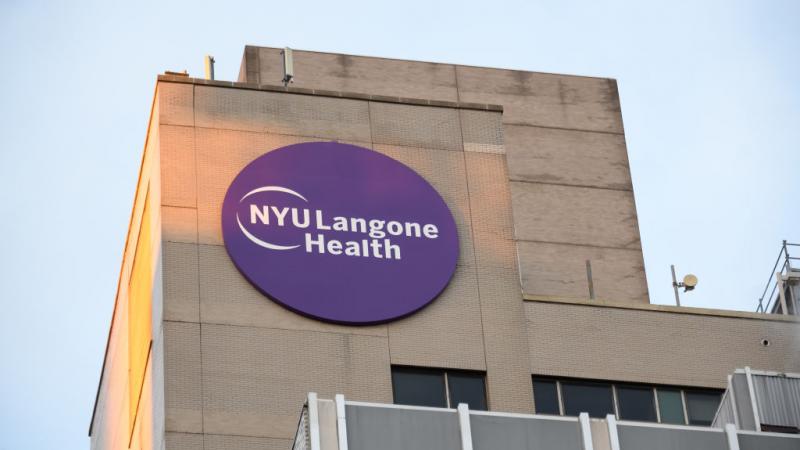Media said Trump's COVID-19 vaccine prediction would take 'miracle.' They were wrong.
Now there are three potential vaccines that could be approved before the end of the year.
Back in May, just after COVID-19 spiked across America, President Trump made a bold prediction about a coronavirus vaccine.
"We're looking to get it by the end of the year if we can, maybe before," Trump said May 14 in a White House Rose Garden event.
The next day, he wrote on Twitter: "Vaccine work is looking VERY promising, before end of year."
The mainstream media didn't like that prediction, not one little bit.
"But experts say that the development, testing and production of a vaccine for the public is still at least 12 to 18 months off, and that anything less would be a medical miracle," NBC News wrote May 15 in a "fact check."
The network cited Dr. Paul Offit, a professor at the Perelman School of Medicine at the University of Pennsylvania and the director of the Vaccine Education Center at Children's Hospital of Philadelphia. "I think it's possible you could see a vaccine in people's arms next year — by the middle or end of next year," said Offit. "But this is unprecedented, so it's hard to predict."
NBC also sought comment from Dr. Stanley Plotkin, credited with inventing a rubella vaccine in 1964. "In the best of circumstances, we should have a vaccine — or let's say vaccines — between 12 and 18 months," Plotkin said.
Meanwhile, FactCheck.org investigated reports that Trump said in September a vaccine would be ready "by the end of the year."
"I didn't say what you said," Trump said in a Labor Day press conference. "What I said is 'by the end of the year.' But I think it could even be sooner than that. It could be during the month of October, actually. Could be before November."
"We looked through Trump's past comments on a vaccine, and did not find any cases in which he declared a vaccine would definitely be available by October or November," FactCheck.org wrote on Sept. 11 in a piece headlined, "Trump Exaggerates Progress."
"But he has suggested that the earlier time frame is even more likely. Experts and governmental officials disagree with that assessment."
Then there was CNN, which wrote a piece in August headlined, "Fact Check: Will there be a coronavirus vaccine by November?"
"Nothing is certain, and Trump's optimism might be crushed in the coming months," CNN wrote. "Some experts warn against throwing out specific dates and timelines. 'I think it's very dangerous at this point to give specific dates,' former Surgeon Gen. Dr. Vivek Murthy told CNN's Wolf Blitzer ..."
For the record, Trump was technically wrong. There isn't a vaccine — there are three.
Pfizer on Nov. 9 said results from its most recent human trials on its coronavirus vaccine show it is more than 95% effective. Pfizer CEO Albert Bourla said Tuesday that once their vaccine is approved by the Food and Drug Administration (FDA), it will be shipped quickly to locations in the U.S.
Then last week, a new vaccine from drug maker Moderna — developed in conjunction with the Trump administration's Operation Warp Speed — emerged and is also nearly 95% effective, but does not have to be kept at sub-zero temperatures like the Pfizer version, the company said.
And on Monday, AstraZeneca and Oxford University said their jointly created COVID-19 vaccine has proven to be up to 90% effective and easier to distribute than another potential vaccine.
"These findings show that we have an effective vaccine that will save many lives," said Oxford University professor Andrew Pollard, who served as the lead investigator for the drug's trials. "Because the vaccine can be stored at fridge temperatures, it can be distributed around the world using the normal immunization distribution system. And so our goal ... to make sure that we have a vaccine that was accessible everywhere, I think we've actually managed to do that."
Pfizer projects making up to 50 million doses in 2020 and up to 1.3 billion doses in 2021. Moderna projects 20 million doses in 2020 and up to 1 billion doses in 2021. And AstraZeneca projects to make up to 3 billion doses of the vaccine in 2021.
Not only will a vaccine be ready before the end of 2020, it could be in use within weeks.
America's vaccine czar on Sunday said immunizations for COVID-19 could begin in about three weeks and that the U.S. could reach herd immunity by next spring.
Moncef Slaoui, who oversees vaccine development for the White House, said on CNN that once a vaccine is approved for emergency use by the Food and Drug Administration (FDA), all 50 states will be able to begin immunizations.
"Our plan is to be able to ship vaccines to the immunization sites within 24 hours from the approval, so I would expect maybe on Day Two after approval," Slaoui said on CNN's "State of the Union." "On the 11th or the 12th of December, hopefully, the first people will be immunized across the United States, across all states."
"You've said you plan to vaccinate 20 million people in the month of December in the United States and up to another 30 million per month after that," said host Jake Tapper. "How many Americans need to be vaccinated for life to be able to return to normal, and when might that happen?"
"So, normally, with the level of efficacy we have — 95% — 70% or so of the population being immunized would allow for true herd immunity to take place," Slaoui said. "That is likely to happen somewhere in the month of May, or something like that based on our plans."
















